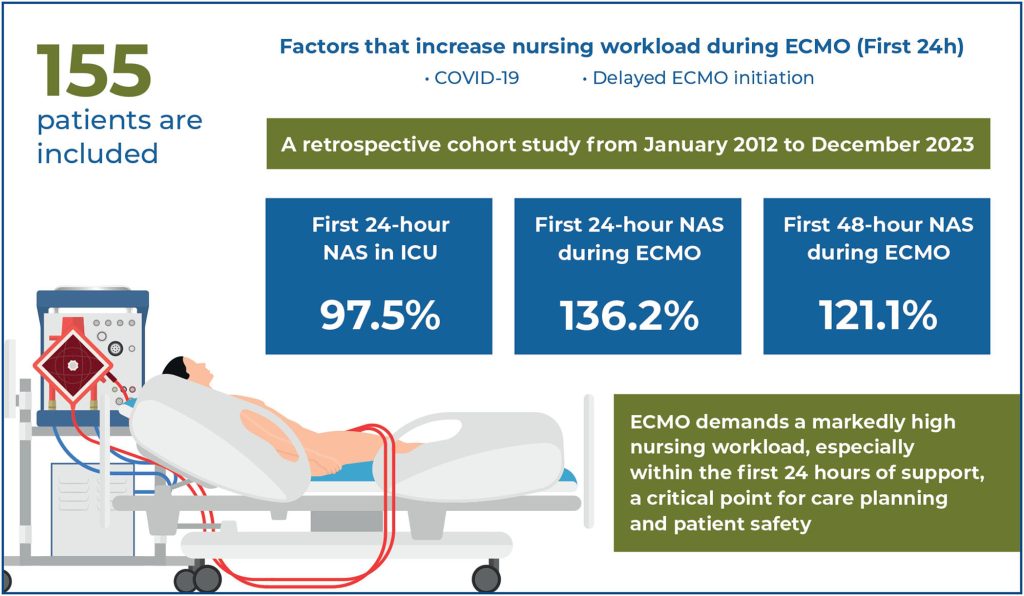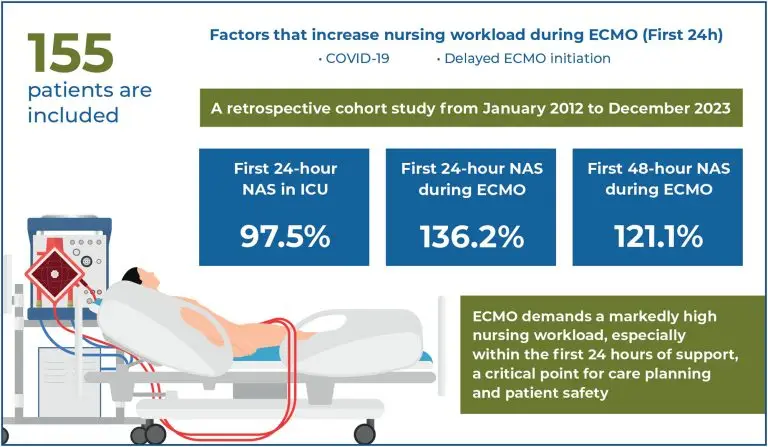einstein (São Paulo). 12/Sep/2025;23:eAO1743.
Factors associated with nursing workload in patients undergoing extracorporeal membrane oxygenation: a retrospective cohort study
DOI: 10.31744/einstein_journal/2025AO1743
Highlights
■ Nursing workload is high with patients undergoing extracorporeal membrane oxygenation.
■ The initial 24 hours of extracorporeal membrane oxygenation have the highest workload, quantified using the Nursing Activities Score.
■ Presence of COVID-19 and delayed extracorporeal membrane oxygenation initiation increase the workload in the initial 24 hours of extracorporeal membrane oxygenation.
■ Extracorporeal membrane oxygenation care demands adjustments in the nurse-to-patient ratio in the intensive care unit.
ABSTRACT
Objective:
To identify the factors associated with nursing workload with patients undergoing extracorporeal membrane oxygenation at 24 hours after initiation, as quantified using the Nursing Activities Score.
Methods:
This retrospective cohort study was conducted at an Extracorporeal Life Support Organization center in São Paulo, Brazil, and included adult patients who underwent extracorporeal membrane oxygenation between 2012 and 2023. Nursing workload was assessed using the Nursing Activities Score at intensive care unit admission and during the initial 24 and 48 hours of support. A linear regression model was used to identify factors associated with nursing workload during the initial 24 hours of support.
Results:
A total of 155 patients were included, with a mean age of 50.8±14.6 years, and 68.1% were male. The mean Nursing Activities Score at intensive care unit admission was 91.7%, increasing to 139.8% in the initial 24 hours of support, and slightly decreasing to 126.9% at 48 hours. The main factors associated with increased nursing workload during the initial 24 hours of extracorporeal membrane oxygenation were the presence of coronavirus disease 2019 (Estimate: 7.112; 95% confidence interval [95%CI]= 2.12-4.43; p=0.005) and the duration between intensive care unit admission and support initiation (Estimate: 2.890; 95%CI= 4.94-8.40; p=0.006).
Conclusion:
The nursing workload in the initial 24 hours of support was significantly elevated, influenced by clinical factors such as coronavirus disease 2019 and delayed support initiation. These findings highlight the need for structured care protocols and adequate nursing staff allocation to optimize patient outcomes and reduce excessive workload in extracorporeal membrane oxygenation management.
[…]
97



